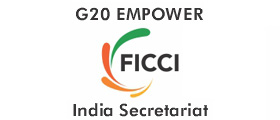If you happen to be in Balangir, drop by at the Shakti Café at the Bus Station – and meet the ever-smiling women who run it.
Or make your way to Harishankar Panth Nivas, a tourist guest house in the remote corner of this thickly forested district. A block level federation of Self Help Groups, the Annapurna Sanchayika Mahasangh, manages the guest house like a professionally-run hotel.
In the Chudapali village, members of Harishankar Women’s Self Help Group run an immensely popular handloom business, selling exquisite sarees, dhotis, and towels.
Travel to Madhiapali, and you will meet women members of the Kamala Self Help Groups – they make Nutrimix, ready-to-eat nutritious meals for children at Anganwadis.
These, and a thousand other enterprises in Balangir within the rubric of Odisha’s Mission Shakti programme for women’s empowerment are booming, and transforming the lives of women.
Every Self Help Group has a signature attire; they come in all colours. But their mascot is pink.
What began with a fistful of grain collection in 2002, today, Mission Shakti – a convergence of the National Rural Livelihoods Mission (NRLM), the State Rural Livelihoods Mission (SRLM) and Women’s Empowerment Mission in Odisha – is a growing enterprise that has 8.5 million-strong membership in the state providing or producing 75 different services or products.
“Ask not what we can do,” holds Suman Dwibedi, the Balangir district programme coordinator of Mission Shakti, “ask if there is anything we can’t do.”
It’s an incredible and trailblazing all-women success story.
“You name it and we have it,” Dwibedi says, as she lists out a wide array of activities that women members of the Mission Shakti self-help groups are involved in, just to demonstrate the amazing range of services and goods the groups are engaged in.
The advantages are manifold: you get into the formal institutional network; gain access to grants and loans; and hand-holding for building capacity and business enterprise.
In 2019, the Odisha Government took a decision to progressively hand over the goods and services required by its line departments to the Self-help Groups and created a separate department, headed by a principal secretary with a dedicated minister to oversee the Mission’s progress.
Balangir – one of the Aspirational Districts in India – is a test case. Like in all other districts of the State, women SHGs are handed over the services that would anyway be outsourced.
“About 8,000 Self Help Groups have been handed over services and responsibilities as income generating activities,” informs Chanchal Rana, the Balangir district collector. In Balangir, Mission Shakti Self Help Groups – 250,000 women – are engaged in 34 different activities.
“Our goal is to build the capacities of women to run their own enterprises,” says Rana.
The Self Help Groups are organised into village, cluster, block and district federations and compete with each other to get the work orders.
“You can see the social and economic transformation already,” Dwibedi says, “Wait another five years – the contribution of Mission Shakti in our State’s economy will be unparalleled.”
 |
These stories of women-led development have been compiled by UN Women India. All copyrights to the stories and images are held by UN Women India Country Office dated December 2022. |

